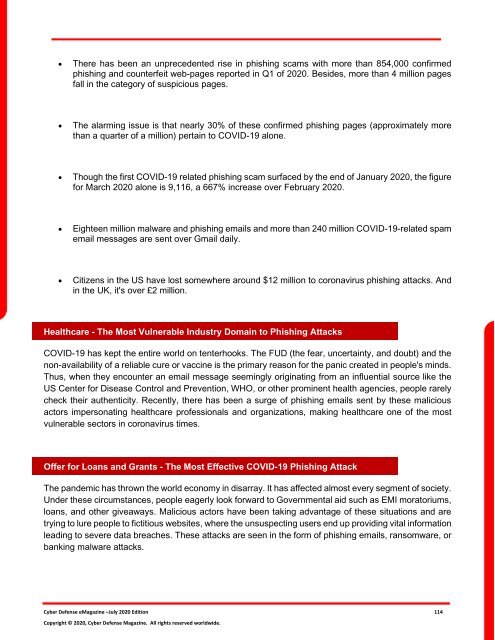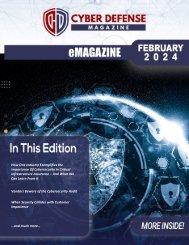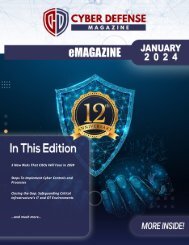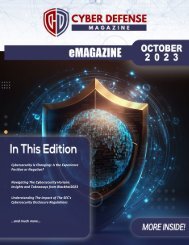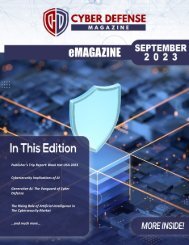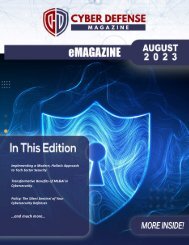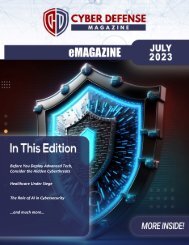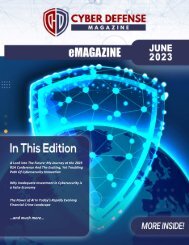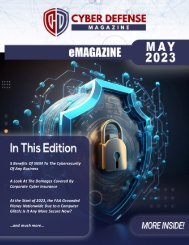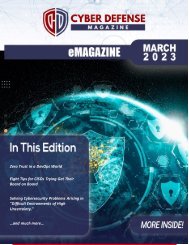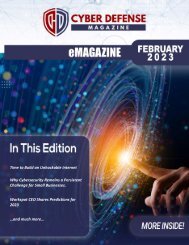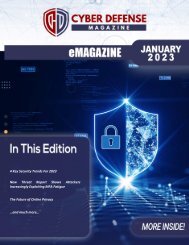Cyber Defense eMagazine July 2020 Edition
Cyber Defense eMagazine July Edition for 2020 #CDM #CYBERDEFENSEMAG @CyberDefenseMag by @Miliefsky a world-renowned cyber security expert and the Publisher of Cyber Defense Magazine as part of the Cyber Defense Media Group as well as Yan Ross, US Editor-in-Chief, Pieruligi Paganini, Co-founder & International Editor-in-Chief, Stevin Miliefsky, President and many more writers, partners and supporters who make this an awesome publication! Thank you all and to our readers! OSINT ROCKS! #CDM #CDMG #OSINT #CYBERSECURITY #INFOSEC #BEST #PRACTICES #TIPS #TECHNIQUES
Cyber Defense eMagazine July Edition for 2020 #CDM #CYBERDEFENSEMAG @CyberDefenseMag by @Miliefsky a world-renowned cyber security expert and the Publisher of Cyber Defense Magazine as part of the Cyber Defense Media Group as well as Yan Ross, US Editor-in-Chief, Pieruligi Paganini, Co-founder & International Editor-in-Chief, Stevin Miliefsky, President and many more writers, partners and supporters who make this an awesome publication! Thank you all and to our readers! OSINT ROCKS! #CDM #CDMG #OSINT #CYBERSECURITY #INFOSEC #BEST #PRACTICES #TIPS #TECHNIQUES
Create successful ePaper yourself
Turn your PDF publications into a flip-book with our unique Google optimized e-Paper software.
• There has been an unprecedented rise in phishing scams with more than 854,000 confirmed<br />
phishing and counterfeit web-pages reported in Q1 of <strong>2020</strong>. Besides, more than 4 million pages<br />
fall in the category of suspicious pages.<br />
• The alarming issue is that nearly 30% of these confirmed phishing pages (approximately more<br />
than a quarter of a million) pertain to COVID-19 alone.<br />
• Though the first COVID-19 related phishing scam surfaced by the end of January <strong>2020</strong>, the figure<br />
for March <strong>2020</strong> alone is 9,116, a 667% increase over February <strong>2020</strong>.<br />
• Eighteen million malware and phishing emails and more than 240 million COVID-19-related spam<br />
email messages are sent over Gmail daily.<br />
• Citizens in the US have lost somewhere around $12 million to coronavirus phishing attacks. And<br />
in the UK, it's over £2 million.<br />
Healthcare - The Most Vulnerable Industry Domain to Phishing Attacks<br />
COVID-19 has kept the entire world on tenterhooks. The FUD (the fear, uncertainty, and doubt) and the<br />
non-availability of a reliable cure or vaccine is the primary reason for the panic created in people's minds.<br />
Thus, when they encounter an email message seemingly originating from an influential source like the<br />
US Center for Disease Control and Prevention, WHO, or other prominent health agencies, people rarely<br />
check their authenticity. Recently, there has been a surge of phishing emails sent by these malicious<br />
actors impersonating healthcare professionals and organizations, making healthcare one of the most<br />
vulnerable sectors in coronavirus times.<br />
Offer for Loans and Grants - The Most Effective COVID-19 Phishing Attack<br />
The pandemic has thrown the world economy in disarray. It has affected almost every segment of society.<br />
Under these circumstances, people eagerly look forward to Governmental aid such as EMI moratoriums,<br />
loans, and other giveaways. Malicious actors have been taking advantage of these situations and are<br />
trying to lure people to fictitious websites, where the unsuspecting users end up providing vital information<br />
leading to severe data breaches. These attacks are seen in the form of phishing emails, ransomware, or<br />
banking malware attacks.<br />
<strong>Cyber</strong> <strong>Defense</strong> <strong>eMagazine</strong> –<strong>July</strong> <strong>2020</strong> <strong>Edition</strong> 114<br />
Copyright © <strong>2020</strong>, <strong>Cyber</strong> <strong>Defense</strong> Magazine. All rights reserved worldwide.


